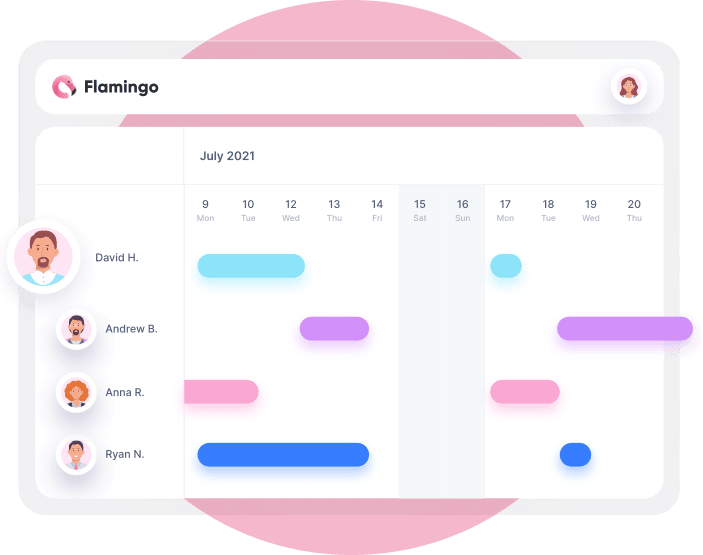
Flamingo is a leave management solution built for modern teams.
No more cluttered spreadsheets and manual data entry. Manage your entire team's leave, directly from Slack, and speed up your leave management workflow.
Learn moreIn this page, we’ll break down all you need to know about leave laws in Italy.
Read on to learn about employees’ rights in regards to paid time off/annual leave, sick leave, parental leave, national/public holidays, and more.
This page is intended for reference purposes only and does not constitute legal advice. Please see official government sources or consult a legal professional for actual legal advice.
Full-time employees in Italy get a minimum of 20 days/four weeks paid annual leave per year.
Employees can carry over as much unused annual leave at the end of the year as they like. However, at least two weeks of annual leave must be used during the calendar year in which it is accrued.
The rest must be used within 18 months of the end of the calendar year in which the leave was accrued.
Starting from an employee’s third year of employment, they accrue an additional 2.66 hours of leave each month, known as ROL or “Reduction in Working Hours.”
This leave may be taken the same as regular paid leave, and if not used by the end of the calendar year, must be paid out to the employee.
Employees in Italy get a maximum of 180 days sick leave each year.
The first three days of sickness are paid by the employer. From then on, sick leave is paid by national social security, at 50% of the employee’s regular pay (for days 4-20 off work) to 66% of their regular pay (for days 21-180 off work).
Italy has 12 nation-wide public holidays:
| Date | Holiday |
|---|---|
| January 1 | New Year’s Day |
| January 6 | Epiphany |
| March 31 | Easter Sunday |
| April 1 | Easter Monday |
| April 25 | Liberation Day |
| May 1 | International Workers’ Day |
| June 2 | Republic Day |
| August 15 | Assumption Day |
| November 1 | All Saints’ Day |
| December 8 | Immaculate Conception |
| December 25 | Christmas Day |
| December 26 | St Stephen’s Day |
Unlike many other countries, public holidays in Italy do not transfer to a Friday or Monday if they fall on a weekend.
Employees are entitled to a day off for public holidays. Workers receive regular pay for public holidays, and double pay if they are required to work on a public holiday.
Pregnant workers get five months maternity leave, with two months taken prior to the birth and three months after. The employee receives 80% of their regular pay from social security, and the additional 20% made up by their employer.
The three months of post-birth maternity leave can be converted to paternity leave if the mother dies or is seriously ill, if the mother abandons the child, or the father is granted full custody by the courts.
Fathers are also entitled to 10 days of paid paternity leave, to be taken within five months of birth.
In addition, both the mother and father are entitled to take up to 11 months (combined) parental leave up until the child is 12 years old.
Workers are entitled to five months paid adoption leave when adopting a child, either nationally or from overseas. Adoption leave can only be taken by one parent.
Employees in Italy are entitled to bereavement leave. They can apply for up to 32 hours of paid bereavement leave per year in their first two years of employment, and 68 hours per year afterwards.
Workers in Italy can usually take up to 15 days of paid leave when getting married.
Students can take paid leave for exams. Workers are also usually given 150 hours of educational leave.
After five years of service, workers are entitled to take 11 months of unpaid educational leave.
Employees are entitled to unpaid leave while on active military service, plus 30 days after discharge.

No more cluttered spreadsheets and manual data entry. Manage your entire team's leave, directly from Slack, and speed up your leave management workflow.
Learn more